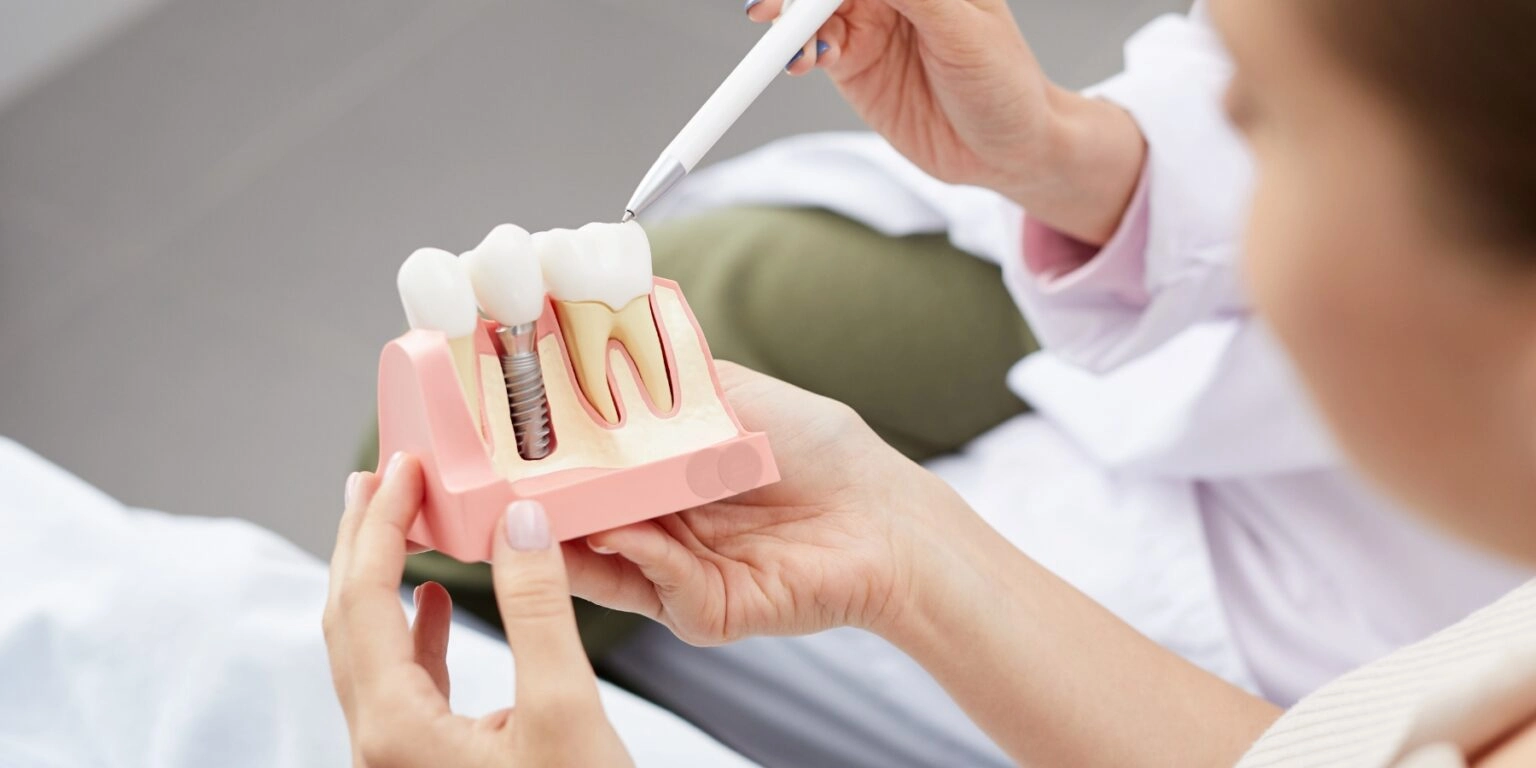Dental Implants in Richland, WA
Home | Procedures | Dental Implants in Richland, WA

Are you looking for a qualified oral and maxillofacial surgeon who can help you acheive successful dental implants in Richland, WA? Dr. Smiley is the oral surgeon for you! With both a medical and dental degree from the University of Washington, Dr. Smiley is equipped to provide excellent dental implant results.
When is a Dental Implant Needed?
When a tooth is extracted or falls out, you are missing not just the crown that can be seen above the gum line but also the tooth root, which is hidden below the gum line within the jawbone. The root plays an important role in holding the tooth in place, but also in keeping the jawbone from deteriorating. Dental implants replace the missing tooth root, creating a stable foundation for replacement teeth.
At Tri-Cities Oral & Facial Surgery, our team specializes in dental implant placement and is ready to help you maintain your smile for years to come.
Why Are Dental Implants the Preferred Method of Tooth Replacement?
Many Tri-Cities patients choose dental implants versus other tooth replacement options due to the vast benefits they provide:
- Dental implants stimulate bone growth and protect against bone resorption.
- They do not rely on support from adjacent teeth, like bridges and partial dentures that hook around or fit over other teeth and can cause damage to them.
- Advances in implant technology have allowed for decades of healthy implants that often last for the rest of your life without needing to be replaced, which can make them a more affordable option in the long run.
- Research shows that dental implants have a higher long-term success rate than other tooth-replacement treatments.
Benefits of Dental Implants
If you are looking for a long-term solution for missing teeth, dental implants have many advantages over other options:
- Designed to Last: Dental implants are typically made of titanium, which is an incredibly strong, durable material that can withstand the force of biting and chewing even the toughest foods. They are also biocompatible, meaning they naturally fuse with the existing bone and have a low risk of rejection. Studies have shown that dental implants have a 94% or greater success rate in most cases.
- Preserve Bone and Facial Structure: Bone loss or resorption is a common issue with missing teeth. Without a tooth root to stimulate the jaw, the bone begins to deteriorate. This limits your future restorative options and changes your facial structure. Dental implants serve as an alternative tooth root that can preserve bone and help your smile keep its shape.
- A Healthier Smile: In order to attach bridges or partial dentures, the teeth around them must be cut or ground down, which can affect the overall health and stability of the tooth. Dental implants function independently and fit snugly between adjacent teeth without causing damage.
- Natural Appearance: Because dental implants help prevent bone loss, they can preserve the natural shape of your jaw bone, gums, and face. In addition, they are designed to blend seamlessly with surrounding teeth and function just like natural teeth. No one will be able to tell the difference, allowing you to feel more confident in your smile.
Dental Implant Consultation
The process begins with a one-on-one consultation with Dr. Smiley. Dr. Smiley will learn more about your goals for restoring missing teeth and any concerns you may have. He will conduct a thorough examination of your teeth and gums, take x-rays, and review your medical and dental history. Afterward Dr. Smiley determines if you are a good candidate for dental implants and explains his recommendations.
Dental Implant Treatment Plan
At the end of the consultation appointment, Dr. Smiley then creates an individualized treatment plan based on your needs. For example, he determines the optimal number of implants and whether any additional procedures, such as extractions or bone grafting, are necessary. He walks you through the entire process so you can feel confident in your decision and the care you are receiving. Additionally, he discusses your options for anesthesia to make the procedure as relaxing and pain-free as possible. Your comfort is a top priority.
Do not hesitate to ask any questions during this dental implant consultation time. Once a treatment plan has been created, your surgery will be scheduled.
How Are Dental Implants Placed and Restored?
On the day of surgery, anesthesia will be administered to numb the area and achieve the desired level of sedation. Once you are comfortable, any extractions or bone grafting will be performed to prepare the site for the dental implant. Often, these procedures can be done in conjunction with one another. However, in some cases, you may need to wait a period of time for the site to heal before the implant can be placed.
- Implant Placement: A high-tech navigation system is paired with digital scans to create a 3D model of your teeth and gums. Thus enabling Dr. Smiley to accurately place the dental implant in the precise location and angle needed for optimal results. First a small hole is drilled, and the implant is inserted into the bone. Next a small healing cap or abutment is placed over the top of the implant. This cap may be buried under the gum tissue, but is most often sticking out of the gums until your final crown (replacement tooth) can be made.
- Abutment Attachment: Your healing cap will be replaced with a healing abutment after the bone and implant have fused together. This fusion is known as osseointegration. This healing abutment will help your gum tissue heal in a natural way to prepare it for the final crown.
- Replacement Teeth: Once the dental implants and abutments are in place, your dentist will take impressions in order to design and customize your replacement teeth. In addition to tailoring the size and shape to match your natural teeth, they will also choose a precise color that blends in as well. These plans will be used by a dental technician to fabricate your new teeth. Once they are ready, your dentist will attach them to the abutments, and your treatment will be complete.
Dental Implant Procedure Recovery
It is normal to experience some swelling and soreness after surgery. You can apply an ice pack to your cheek and take an over-the-counter pain reliever to help minimize any discomfort. You may receive prescription pain medication and/or antibiotics. To help prevent infection, gently swish a warm salt water solution around your mouth after the first day. Additionally, continue brushing your other teeth, being careful to avoid traumatizing the surgical site.
Start by eating very soft foods that require little to no chewing the first few days. Then, slowly progress to more solid foods as tolerable, once again avoiding the implant site. You will receive detailed post-op instructions, but if you have any questions or concerns, reach out for guidance.
Your Dental Implant Specialist in Richland, WA
As an oral surgeon with a medical degree as well, Dr. Smiley is well-versed in performing both simple and complex dental implant procedures and safely administering anesthesia. Find out if you are a good candidate for dental implants by calling to schedule a consultation appointment (509) 802-6026.
"*" indicates required fields
Tri-Cities Oral & Facial Surgery Dental Implants & Wisdom Teeth in Richland, WA
Richland | Pasco | Kennewick
Tri-Cities Oral & Facial Surgery is proud to serve patients throughout Richland, Pasco and Kennewick, WA and surrounding areas. We offer a wide range of oral surgery services including dental implants, wisdom teeth removal, tooth extractions, and bone grafting, as well as sedation options to enhance your safety and comfort. Centrally located near Pasco and Kennewick, WA, we are the convenient practice to visit for your wisdom teeth, dental implant and other oral surgery needs.



